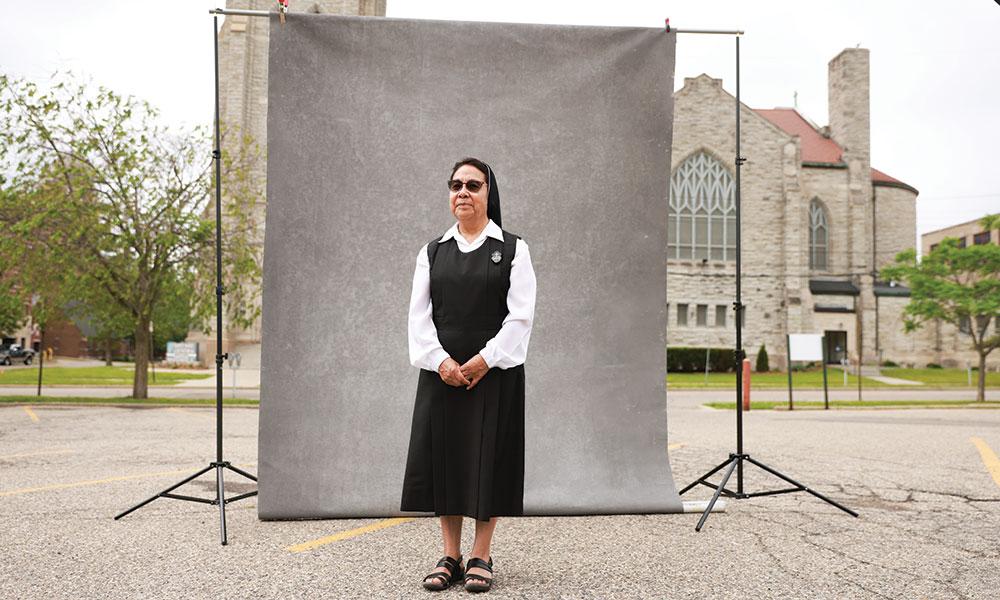
‘I Love That My Life Is for Me to Contemplate the Face of Jesus in My Brothers and Sisters’
Sister Maria’s Work With Migrants
Sister Maria’s Work With Migrants
Sister Maria Antonia Cruz’s love for the migrant people she serves every day is rooted in her love of Jesus, a love that has guided her life from the beginning. “I was born in Tlaxcala, Mexico, into a family with three girls and one boy. When I was very young, I felt my vocation,” says Sister Maria Antonia. “My mom was in charge of helping with everything at the parish – I grew up that way. I met some different sisters, but when I met the Passionist Sisters, I knew immediately that I should go with them. I was 15. My father told me to stay and get married, but I told him and my mom I wanted another kind of life. I remember that on May 8, they brought me to join the sisters. Since that day, I have been very happy.”
Sister Maria Antonia’s journey included years of formation, the making of religious vows and extensive travels to serve God’s people around the world. “I’ve been to Rome, Spain, the Dominican Republic, El Salvador and the United States,” she says. “I came to the U.S. in the early ’90s and took an English-language class. From that day to today, I have shared my life with Hispanic people and migrants around the country.”
The Passionist Sisters currently have 14 sisters in four communities in the U.S. Living in community and serving the poor and needy, the sisters give their lives out of love of Christ to every person they encounter.
“After being in Lansing for about a year and a half, I went to Illinois, Nebraska and then back to Lansing,” says Sister Maria Antonia.
Sister Maria Antonia’s work is currently in Clinton County, where she forms relationships with people who otherwise might not have access to the ministries of the Church. Her efforts include daily visits to farms where many migrant people work, in-house Bible studies and talking and praying with people who, after working 12-hour days and without transportation, do not have the time or means to attend church programs or even Mass.
“The superior of my religious order describes us as people who multi-task. We visit the sick, go to the hospital, help with quinceañeras, run RCIA programs, help the parishes. We are trying to meet the needs of the people,” Sister Maria Antonia says. “Right now, their lives are very challenging. And formation is hard because many of them believe in God but have little time for Mass or other things. Some people want the sacraments, but time is a real challenge for them. For RCIA, they must have the catechesis by group, but they don’t necessarily have the time. What can we do for the people? They have faith but their situation is complicated.
“I try to visit to pray the Rosary. I stay at the farms and talk to them. I pray with them, but they are working, so I walk from spot to spot at the farms to meet them where they’re at. For Advent, we have a retreat for whatever amount of time works for them. In May we try to get a lot of families to pray the Rosary. The people who open their houses invite others, and we meet more people that way. I take advantage of the opportunity to bring them a little information.
“The founder of my order says that to help the needy is not madness. I like that phrase from my mother because I think this is the reality with migrant people. I don’t really do anything to change their situation, but I share my time with them. They feel comforted.”
Sister Maria Antonia believes her multi-tasking boils down to one non-negotiable item: “I do visit and meet people and see their necessities, but really I invite them to know Jesus. It’s hard to go everywhere I go, but I feel good because of this,” she says. “This is the work of the Church. I think we need even more from the Church – more commitment, more people to visit and more people to support the migrant people.”
Sister Maria’s work with migrants, although hard, is the mission God has invited her to carry out, and it is not without the graces and consolations that come from following Jesus: “I love my life. I love that my life is for me to contemplate the face of Jesus in my brothers and sisters. This is my reason to stay with migrants.”
WANT TO HELP?
Contact the director of Hispanic Ministry for the Diocese of Lansing, Susana Chapa, at schapa@dioceseoflansing.org
